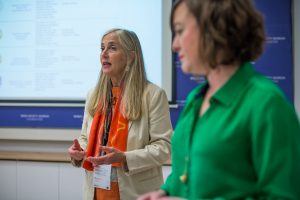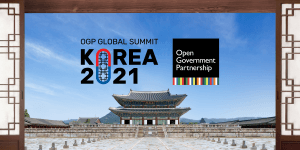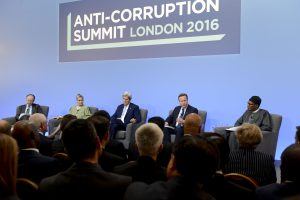Five Years Later: Four Lessons We Learned from the London Anti-Corruption Summit
It’s been five years since the United Kingdom hosted the London Anti-Corruption Summit, where 43 governments made over 600 pledges to tackle corruption. In the intervening period the political focus on corruption at the international level has waned, but that is changing. We’re seeing anti-corruption on the agenda of major 2021 summits, including the G7, the Open Government Partnership (OGP) Global Summit, and U.S. President Joe Biden’s proposed Summit for Democracy, likely to take place early in 2022. It’s good timing, therefore, to look at what lessons can be learned from the London Summit on how high-level international events can have a lasting impact on an issue like corruption.
The first lesson, grounded in tracking work led by Transparency International UK (TI-UK), is that Summit pledges alone are insufficient to change the status quo on corruption. While the London Summit yielded more specific pledges than many communiques, the majority of pledges could not easily be monitored, often because they were too vague. This points to the need for more specificity in future pledges. Nonetheless, TI-UK took forward the monitoring of approximately 180 pledges, made by 20 countries across six priority policy areas (Asset Recovery, Beneficial Ownership, Law Enforcement, Open Data, Public Procurement, Whistleblower and Civil Society Space Protection). In this assessment, TI-UK found a completion rate of 21.7%, while 52.8% are still ongoing. Among the pledges considered too vague to track, we can assume the implementation rate is much lower. This means that we can extrapolate that a maximum of approximately one in five of the reforms that were lauded in London by the Summit host, then-U.K. Prime Minister Cameron as “a series of ground-breaking commitments that can really transform our ability to tackle corruption,” have been fully implemented to date, with others still in progress.
The second lesson, grounded in OGP data, shows the importance of civil society monitoring and embedding Summit pledges into national implementation plans. New analysis shows that 93 of the London Summit pledges were subsequently translated into 97 commitments in the biannual OGP action plans co-created between domestic civil society and government. These 97 commitments were assessed by OGP’s Independent Reporting Mechanism as being slightly more ambitious than the average OGP anti-corruption commitments, perhaps suggesting that the high-level political attendance in London helped in raising ambitionAccording to OGP’s Articles of Governance, OGP commitments should “stretch government practice beyond its current baseline with respect to key areas of open government.” Ambition captures the po... levels. In addition, the rate of implementation of pledges embedded in OGP action plans was similar to the one-in-five rate for pledges monitored by TI-UK, indicating that embedding commitments in OGP plans is a viable way to sustain external accountability. Using OGP as a vehicle for accountability has the advantage of being more easily scalable (as it relies on an existing mechanism), with established and credible independent monitoring, and greater local ownership. Thus to ensure better follow-through, the second lesson is to embed global pledges in concrete national implementation plans – such as through OGP – which enable regular dialogue with civil society and a monitoring framework. This lesson is supported by TI-UK’s monitoring reports and by new OGP research in this area that shows spaces for multi-stakeholder dialogue are associated with higher levels of implementation for open government reforms, underscoring the importance of sustained, domestic buy-in and engagement during implementation.
The third lesson is that pledges in certain thematic areas were stronger than others. For example, many countries committed to increasing beneficial ownership transparency, an emerging global norm in 2016 that has since seen an explosion of interest after the Panama and Paradise Papers scandals. These pledges benefited from being specific and actionable, such as countries committing to establishing public central registers of company beneficial ownership information. Fifteen of these were translated into OGP commitments. For example, Nigeria pledged to “establish a public central register of company beneficial ownership registration” at the London Summit and later implemented this commitment through its 2017 and 2019 OGP action plans. The lesson here for both future summit hosts and civil society advocates is to focus on securing pledges that are specific and time bound, in a select set of policy areas where global ambition needs to be lifted, and with an emphasis on quality rather than quantity. A focus on select, high-quality pledges would also sharpen the focus of advocates and reformers within government.
The final lesson is to ensure that follow up and accountability for implementation is not an afterthought but is baked into the design of summits. TransparencyAccording to OGP’s Articles of Governance, transparency occurs when “government-held information (including on activities and decisions) is open, comprehensive, timely, freely available to the pub... More International UK’s tracking efforts were hampered by a lack of consistent data, declining political interest as time passed from the London Summit and shifting political agendas in the UK. While Cameron at the time said “we have been clear that this summit will not be a single one-off moment,” in reality political events in the UK, most notably Brexit, meant that anti-corruption quickly slid down the priority list. It was also clear that the primary focus in advance of the London Summit was securing high-level attendance and getting countries to sign up to long lists of pledges, rather than on domestic consultation, quality pledges, and the acceleration of ongoing reform efforts.
The designers of the upcoming US-hosted Summit for Democracy can send a clear message that any anti-corruption – or other – pledges that invited countries plan to make should be discussed with civil society in advance and embedded into national implementation plans, such as OGP action plans, afterwards. USAID and other assistance providers around the world can then align their political, financial and technical support behind the implementation of those plans and help increase the likelihood that reforms will achieve their intended impact.
Related Content
 Challenges and Solutions
Challenges and Solutions
Open Opportunities: Making the Most of 2021 Global Summits
As the world looks to a post-pandemic future, a number of global fora in 2021 offer opportunities to chart the course toward building back better and renewing our democracies.

2021 OGP Global Summit: Seoul, Republic of Korea
Thanks for joining us at the 2021 OGP Global Summit. Find recordings, announcements, new publications, and more.

Anti-Corruption in OGP
Corruption harms everyone by taking tax dollars from needed public services and projects. For OGP members, fighting corruption is essential to transparent, responsive, and inclusive government.


Addelis Sibutha Reply
Corruption widens the inequality gap. Anti-Corruption institutions are unfortunately not fairly or objectively constituted since there seems to be some reluctance with those appointed to bring to the foe cases of corruption that involve those that appoint them. We seem to see, for instance in my country, where we have big names being investigated brought before the courts of justice but then being released. So we have coined a new term of “Catch and Release.” It is in the interest of the citizenry and the economy that the Anti-Corruption Body sets some examples of punishment to deter any future malpractices and reposes any ill-gotten wealth.